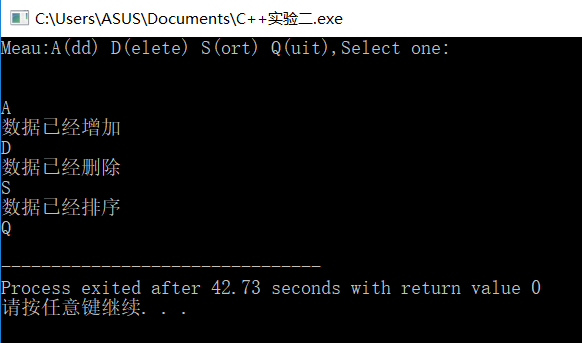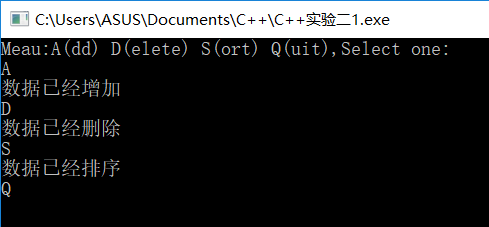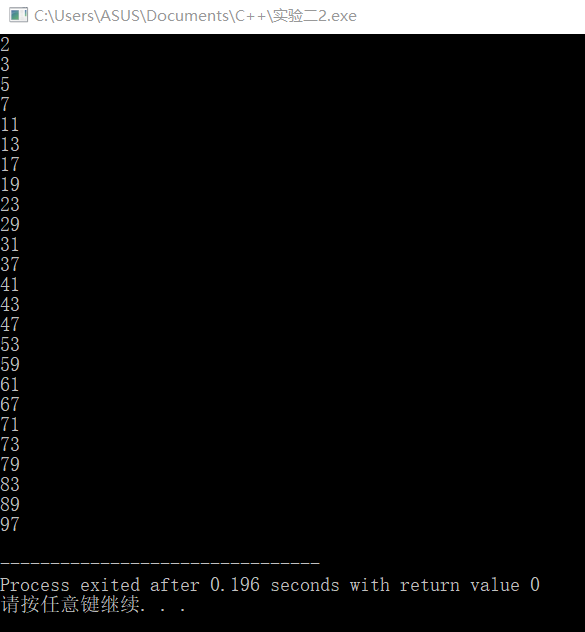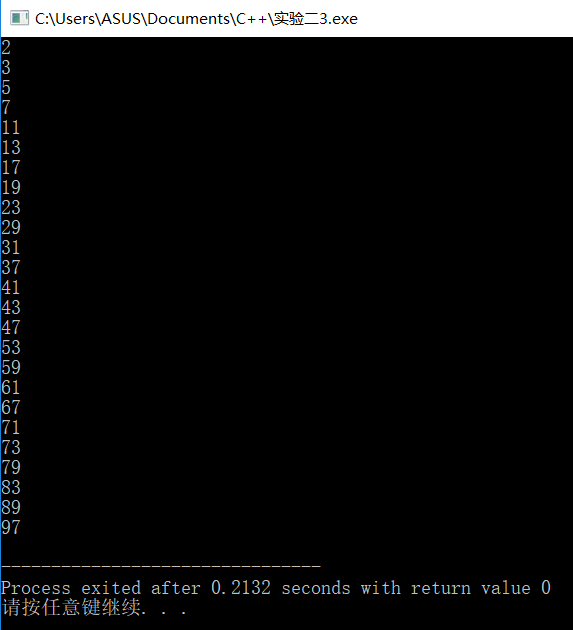#include<iostream> using namespace std; int main() { char x; cout<<"Meau:A(dd) D(elete) S(ort) Q(uit),Select one:"<<endl; while(true) { cin>>x; if(x=='Q') break; if(x=='A') { cout<<"數(shù)據(jù)已經(jīng)增加"<<endl;continue; } else if(x=='D') { cout<<"數(shù)據(jù)已經(jīng)刪除"<<endl;continue; } else if(x=='S') { cout<<"數(shù)據(jù)已經(jīng)排序"<<endl;continue; } } return 0; }

#include<iostream> using namespace std; int main() { char x; cout<<"Meau:A(dd) D(elete) S(ort) Q(uit),Select one:"<<endl; while(true) { cin>>x; switch(x) { case 'A':cout<<"數(shù)據(jù)已經(jīng)增加"<<endl;continue; case 'D':cout<<"數(shù)據(jù)已經(jīng)刪除"<<endl;continue; case 'S':cout<<"數(shù)據(jù)已經(jīng)排序"<<endl;continue; case 'Q':break; } } return 0; }

#include<iostream> using namespace std; int main() { int i,n; for(i=2;i<=100;i++) { for(n=2;n<i;n++) { if(i%n==0) break; } if(i==n) cout<<i<<endl; } return 0; }

#include<iostream> using namespace std; int main() { int i=2; while(i<=100) { int n=2; while(n<i) { if(i%n!=0) ++n; else break; } if(i==n) cout<<i<<endl; i++; } return 0; }

#include<iostream> #include<cstdlib> using namespace std; int sj() { int sj=rand()%101; return sj; } int main() { unsigned seed; int n,js; cout<<"輸入種子"<<endl; cin>>seed; while(true) { srand(seed); js=sj(); cout<<"輸入猜的數(shù)"<<endl; cin>>n; if(n!=js) { cout<<js<<endl<<"再猜一次"<<endl; seed=js; continue; } else cout<<"你猜對了"<<endl; break; } return 0; }

#include<iostream> using namespace std; int main() { int t; for(int i=1;i<=5;i++)/*剩下一個球*/ { for(int m=1;m<=4;m++)/*剩下第二個球*/ t++; } cout<<"共有"<<t/2<<"種方法"; /*有一遍重復*/ return 0; }

四.1.(1)函數(shù)聲明表示有這么一個函數(shù)的存在,而函數(shù)定義則具體實現(xiàn)這個函數(shù)
(2)形參就是只在被調(diào)用時存在,并且在函數(shù)中不斷改變,而實參則存在于函數(shù)之外,不會改變。
函數(shù)參數(shù)節(jié)約了內(nèi)存,也使函數(shù)更為簡便。返回值就是經(jīng)一系列計算得來的某一數(shù)據(jù),返回至原函數(shù),來得出相應的值。
(3)值傳遞僅僅傳遞了值,而引用傳遞則傳遞了相應的內(nèi)存地址。
五.收獲:同一個問題可能有多種解決方法,我們需要做的則是開闊創(chuàng)新,發(fā)現(xiàn)新的更好的方法。



 浙公網(wǎng)安備 33010602011771號
浙公網(wǎng)安備 33010602011771號